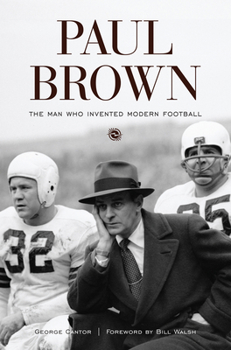Paul Brown: The Man Who Invented Modern Football
Select Format
Select Condition 
Book Overview
The first full-length biography of the legendary head coach of the Cleveland Browns, this book explores how Paul Brown worked his way from high school coach to pro football Hall of Famer, while... This description may be from another edition of this product.
Format:Hardcover
Language:English
ISBN:1572437251
ISBN13:9781572437258
Release Date:September 2008
Publisher:Triumph Books (IL)
Length:224 Pages
Weight:1.13 lbs.
Dimensions:0.9" x 6.0" x 9.2"
Customer Reviews
2 ratings
Not Loved, But Appreciated
Published by Thriftbooks.com User , 15 years ago
Book broken down into chapters discussing Browns's biggest wins in his coaching career, this book was an interesting read. It deals with his whole career, not just those games but the latter gets preference. It's pretty unbiased, too, giving both sides of the story during several controversies in Brown's career. I'm just a big fan of pro football, not of the Browns, so I went into this book with a pretty unbiased look myself. I came away with mixed feelings of the great coach, but mostly those which are positive. The man was a winner, no doubt, but another of these obssessive coaches in which you wonder if you'd want to play for him. No former player really "loved" Paul Brown, it's pointed out several times in the book. But you read this book, you have to come away with a lot of admiration for this man and what he accomplished in football - a true innovator and one of the best, if not THE best, football coaches of all-time. He doesn't get his due because we live in the Internet Era and history gets lost fast in there.
The Greatest Ever in Gridiron Glory
Published by Thriftbooks.com User , 16 years ago
The influence Paul Brown continues to have on pro football is enormous, though he passed away in 1991 at the age of 82. In one of two recently published biographies on "the father of the modern offense," author George Cantor weaves his material around 10 famous games that Brown coached; two each for Massillon Washington High School and the Ohio State University, five for the Cleveland Browns and the famous 1970 contest when the Cincinnati Bengals edged the Browns, 30-27. Cantor pounds hard like a fullback on the incredible coaching record Brown, which came to prominence with Massillon, taking the helm in 1932 at age 23 and eventually capturing by polls six-consecutive state titles, while amassing a record of 80-8-2 in nine years. From 1941-1943 at Ohio State, Brown was on the verge of creating a collegiate dynasty, winning the 1942 national championship and leading the Buckeyes to a three-year record of 18-8-1. After coaching the Great Lakes Naval Station Blue Jackets for two years came the foundation to a remarkable 17 years with the Browns. Though Brown was the "coach in absentee" with Ohio State, he ultimately became part-owner, head coach, vice president and general manager of Cleveland's franchise in the All-America Football Conference. The club garnered its nickname either from heavyweight champion Joe Louis - shortened from a suggestion of the Brown Bombers - or to honor Brown. The Browns won all four championships in the AAFC, before the league merged with the National Football League, where the team won three titles. Among the innovations Brown introduced to the game during these years were the creation of what is now known as the "West Coast" offense, compiling a game film library, teaching the game in a classroom setting, talking to his quarterbacks through a radio transmitter, using "messenger" guards to relay plays to the offensive huddle, emphasizing safety through the use of face masks on helmets and having a reserve squad (known as a "Taxi squad," because the players drove cabs for co-owner Arthur McBride's Cleveland taxi company). Special focus is on January 9, 1963, when Brown was fired by Browns majority owner Art Modell, which was done during a Cleveland newspaper strike. A tenuous relationship during the early years of Modell's ownership, the partnership permanently fractured over running back Ernie Davis, the sensational 1961 Heisman Trophy winner who was a member of the team, but never played due to suffering from leukemia and losing his battle with the disease on May 18, 1963. Brown refused to play Davis when the cancer was in a brief remission. Depending on the story, this controversial chapter of team history, Modell wanted Davis to only make a brief appearance in a game to honor the player's wish or the majority owner was looking to cash in on his substantial investment in a player who was never going to recover from the disease. The five years away from the game found Brown laying the foundation for an expa






